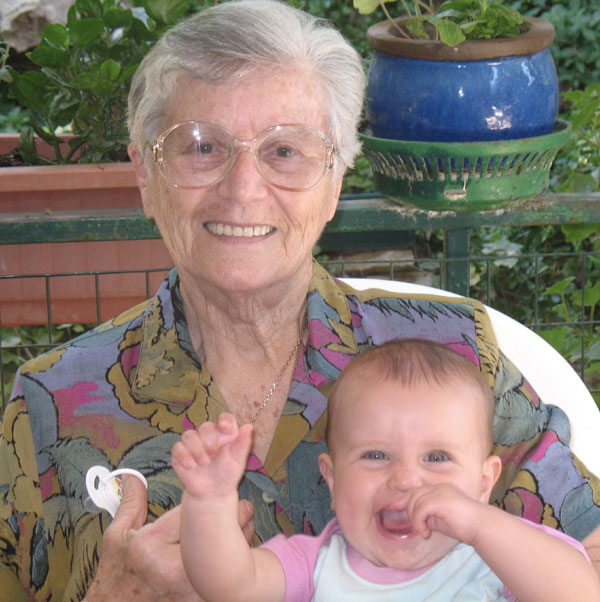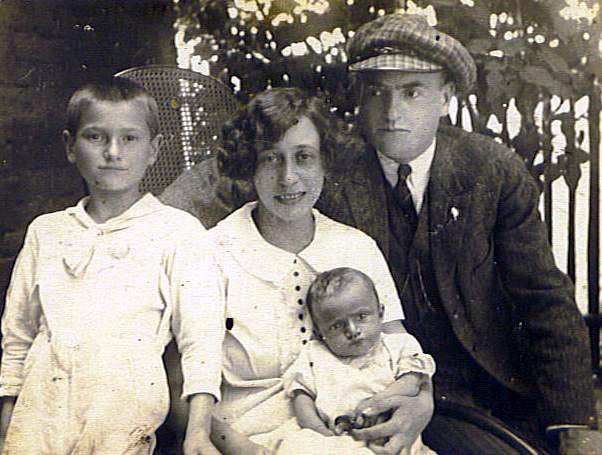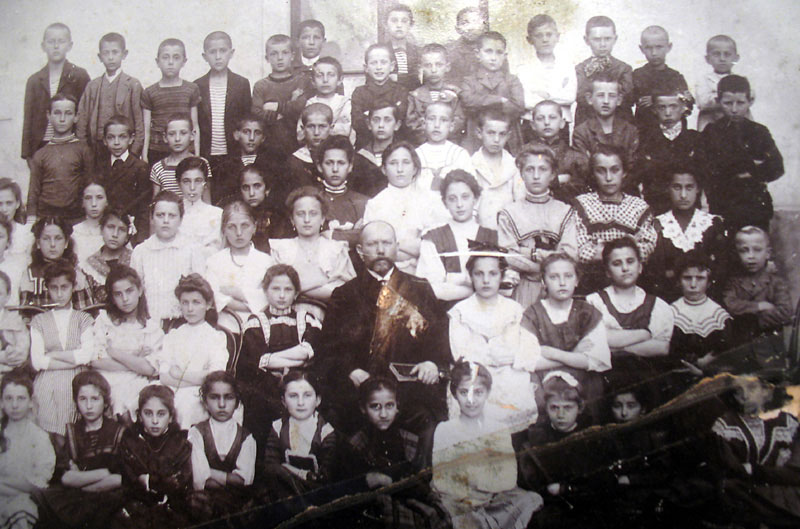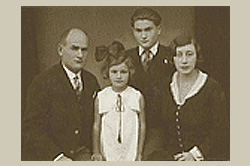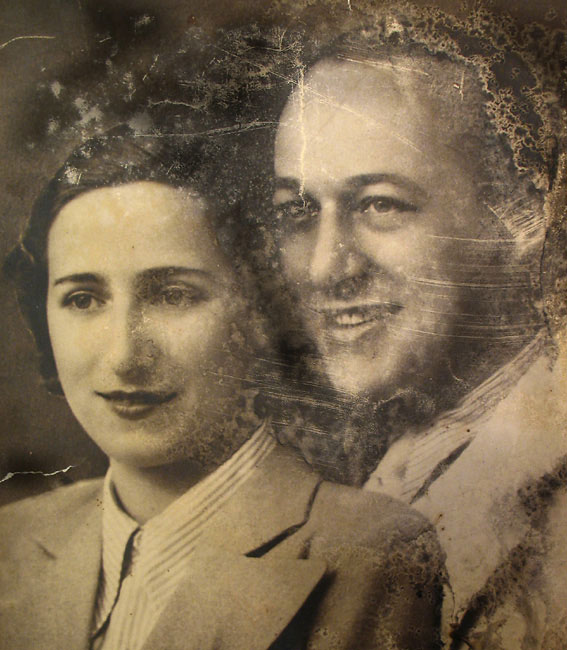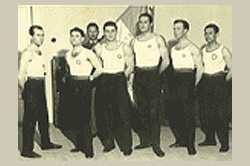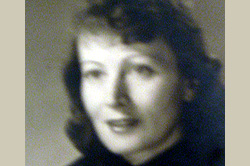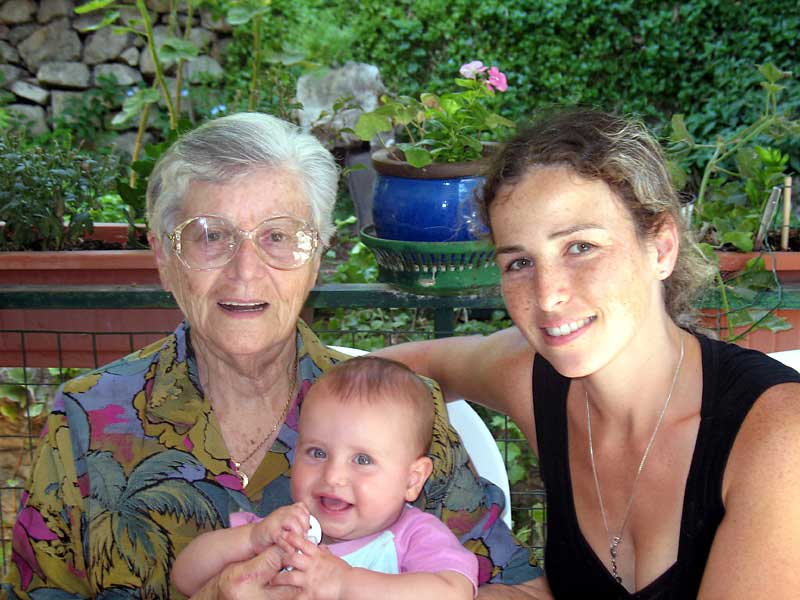Introduction
This exclusive interview was published in our newsletter Teaching the Legacy (May, 2008). The original interview, conducted in Hebrew, first appeared in our Hebrew edition of October, 2007. While focusing on the touching wartime story of Hedi Solzbach, several issues arise which are intrinsically linked to the female experience in the Holocaust. Thus, for instance, we hear about the day-to-day banter in the women's block at Birkenau, the humiliation of nakedness and fear of bodily harm, use of margarine as an anti-wrinkle cream, "support groups" amongst the female prisoners, care for others as a strengthening or consoling experience, and more. In many ways, Mrs. Solzbach's testimony highlights the "dual" experience, or "double jeopardy" – as it is known in the research – which typified Jewish women during the Holocaust, particularly in the camps, both as Jews and as women.
"They would take you if you'd just open your mouth or if they didn't like your face"
Please tell us a little about your childhood.
I was born into a traditional family in Sobotice, a small town near Novi Sad, [Yugoslavia; today, Serbia] on February 9, 1925. Grandpa Czarny kept a kosher kitchen and was also a member of the Jewish community in Novi Sad. There is no longer a community there. I had a brother, Latzi, from my father's first marriage. When he was three years old, my [birth] mother and father separated, and my father married my mother, so from age three, he was with my mother. In between Latzi and myself, we had a [third] child who died, and then I was born. So there are nine years between myself and Latzi. That's my small family.
I would speak Hungarian with my mother, Yugoslavian with my father, and German with my grandfather. My elementary school was a Jewish day school, and then I went to a general school.
You knew you were Jewish? Did you go to synagogue on the Sabbath? Fast on Yom Kippur? [Jewish Day of Atonement – trans.]
Of course. Father went to synagogue in the morning and at night. I began fasting from age 12 – I even fasted in Auschwitz. I had two Jewish friends there. One of them was very religious and knew all the prayers by heart. We spent our Yom Kippur there. Then I was in Gleiwitz – a coal factory, a sub-camp of Auschwitz. We worked with coal, and I fasted there.
What do you remember from the outbreak of the War?
With us, the Hungarians came in 1941, and then the hell started. In fact, [it started] even earlier, when I finished school in 1939 and wanted to go study at a teaching school. I very much liked children. There was a special childcare school in Belgrade, where I had two aunts – sisters on my father's side – and an uncle, and I had a place to live in, but I wasn't accepted because I'm Jewish. In 1940, everything was closed – Jews could hardly study anything anymore [in schools – trans]. You couldn't move right or left. Then, in 1941, the Hungarians came. Father told me, "My child, you have no choice, you must learn a profession which will provide for you in the future."
He very much wanted me to study a profession, and in those days every Jewish girl learned to sew. I thoroughly hated it, but it later served me very well. There were no courses like there are today. For two or three years, you had to study as an apprentice with a teacher, and I went to study. I had to pay, and I didn't have any money – my father had been paying once a month – and he didn't have a job anymore, so I told him, "No! You're not paying! I will do all the work."
This wasn't simple for me. Our family had been a prominent, distinguished family, and we were very wealthy. It wasn't easy for me, it was very difficult. [...] I worked all day – sewing and felling trees for the owner of the sewing workshop, and then later with small children that I would look after.
Were you scared of the Arrow Cross Party, of the Hungarians?
Of course. They would take you if you'd just open your mouth or if they didn't like your face.
At this stage, when you were 16, and working for this woman, were you alone?
No, I was with my parents. I would sleep at their place at night. My brother went to Budapest thinking he'd find a job there, because there was no work for him in Novi Sad. Luckily we still had our jewelry, so we sold them and lived off that. We didn't have any socks or shirts, so we would insert the shirt collar inwards, unravel it and turn it over. My mother would do this for the Jewish community and earn a small pittance. Socks, too – we couldn't buy any, because there weren't any, so she would match socks from different pairs.
You were hungry then?
No. Mother took care of that very well. I still didn't have a salary. That's the thing that hurt me – today I'm 82 years old but I remember it as if it was today. For me it was humiliating. It's hard to talk [about it]. Our family was an honorable family and here I have to sew dresses in the living room and take them to the clientele? Walking in Novi Sad, "Mrs. Hedi," meeting acquaintances... It was very difficult for me. After a few weeks I adjusted, and I would get a tip for each [dress], and that was money. Money is money. So I was happy, and I could bring dresses to the clients and get some money.
Age 16 – that's an age of blossoming for a young woman. Did you feel you were being robbed of your childhood, or were you too busy simply trying to survive?
I was so preoccupied with thoughts of how to live and how to survive in this situation, so I worked all the time. I would sew from seven to three, then I would run home to eat something, and then I had three children I would look after until seven. I would go for a walk with them, or we would play at the house. They had silk stockings and they would sometimes split. I would sew with a special needle. It's difficult for me to tell, because I came from a very rich, respectable family. It was like I had been cut with a knife. But I told myself – "I must work!" Our days with a maid were over – that I understood. Finita la comedia.
"She didn't hand it to him – she was a proud woman"
What happened when the Germans reached Novi Sad?
The Germans arrived in March, 1943. The first thing they did when they arrived was take the men. My father had an acquaintance who had hot springs – springs with mineral water – and father used to go to him for treatment. As soon as the Germans arrived, he escaped from there and stayed for two days. They took my brother. They took him together with other men from Novi Sad to a giant courtyard. There was a coffee shop there – "Sloboda" – and they were led inside. I took food for him, because they hadn't received any food, and we stood in line [outside] to come in. I was scared. The German officer took me aside and I thought that was the end of me, but he didn't do anything.
On that day, the Germans lined up the men in a row and beat them. Latzi, my brother, was an athlete, and very strong, so he ran, and they told him to slow down. He had been beaten, and when I brought food for him, he was bruised all over. Later on he managed to escape from there, and traveled to Budapest. Father came back at 3 AM from his friend, and wouldn't leave the house. Then we were thrown out of our home because we were Jewish, and that was another blow. We searched for another place to live, and we couldn't find anything because we were Jewish. Eventually we got a tiny apartment from the Methodist community, with no drinking water and no toilet except for a small room in the yard. It was very difficult. We would have to walk over half an hour to draw drinking water from a well. In the winter it would freeze over, and I would bring hot water from home and pour it in so the ice would melt and I could draw the water. Father was closed in his room, and would have to do his business there, because he couldn't leave – he would be seen. He was closed in this way for two weeks. Then they said they were taking all the Jews to work.
In April, 1944 they took us. The Hungarians came and demanded all our jewelry, but the day before I told mother, "You're thinking of giving them all our jewelry? Give me what's left." She gave me some items and I took them to a girlfriend of mine. I later found it, after the liberation, and everything was there, just I had left it. Nothing was missing. So when the Hungarians came, mother only had a ring on her finger. A Hungarian demanded she take it off and hand it to him. So mother removed the ring, threw it far, and said to him, "Now go look for it." She didn't hand it to him – she was a proud woman.
Later they took all over us to the synagogue, and from there to Sobotice. They separated the men and the women there, and they took only the women, not everyone. That was the last time I saw my father. I said goodbye. From there, they took us to Bačka Topola, and from there to Auschwitz, in the closed cars. This took around a week. In the car, I was with my mother, the whole time.
In the train car, what did you talk about with your mother?
What could you talk about? It was very crowded and smelly. We took a small bag with a little bit of food, because we hadn't gotten anything else. It was just like what you see in the movies: "Raus! Raus!" ["Out! Out!" – trans.] The whole time, we thought we were being taken to work. We said this must be work and that with God's help, I am strong, I had always been strong and I can work, no matter what job we're given. My mother was then 50 years old.
We arrived at Auschwitz in the morning, before noon. We were lined up in rows of five. Mister Mengele came, and I was put on one side and my mother on the other. Mother was quite strong and she said she wants to be with her daughter. He asked her if she could run. She answered, "Sure, I have legs." She was always proud of her strong legs. Then she went over to my side, and the capos came. I had special warm shoes. They asked me to give them the shoes. "No. Are you crazy?" They asked for the sweater as well. I refused. How could I have known that in half an hour I would be naked? Then they took us into another room and forced us to strip entirely. [The meaning here is the "Sauna," meaning "shower" in German. This was the place where Jews were sent who had cleared the selection process and had been chosen for forced labor. They were forced to strip naked, and all their head and body hair was shaved. They were sterilized, received prisoner uniform and clogs and, in most cases, were tattooed with a prisoner number on their arm.]
In the room there were SS officers and capos. I didn't know where to put my hands and what to hide. It was horrible. I shudder just thinking about it. You can't describe something like that. Then they shaved off all my head and body hair, but they didn't shave everything off. They left a little bit of hair, like monks.
When they finished, we got our clothes. These weren't striped prisoner uniforms but more like rags. I got one man's shoe and one woman's shoe. I also got a long skirt and a coat. I'm [a] large [woman], and without a bra, it was so painful, I thought I would die. We did get underwear. My mother was very brave and stole some more underwear from the [pile of rags]. We were scared to death, but she took some. When we had gotten all our clothes, we stepped outside and there was a brush with red oil paint. We were marked with a stripe on our backs. They tattooed the number on the arm later. We had gotten a handkerchief, and because I was very strong, I cut it and tied it around my chest, so it wouldn't hurt as much.
In the Sauna, you were with your mother and presumably with other women you knew as well. When you left, did you recognize each other?
We didn't recognize each other. I looked at my mother and thought, "This is my mother?" Later we reached the camp. We slept six to a bunk, three in each direction. I was with my mother the whole time. I always went to a place where there was a window. I had this "bug" where I had to breath fresh air. We were told not to drink water because we could get typhus, so I didn't drink. They had what they would call "tea" or "coffee," which we could drink because it had been boiled.
In the first few days, did you eat the food you were given?
No, of course not.
Describe the initial days in the camp.
Near our block [barrack] we had a giant courtyard with a large pile of rocks. I was taken to work in moving the rocks from place to place. My mother wasn't with me working, she was in the block. Before that we had morning "zelapel" and evening "zelapel" for hours. ["Zelapel" – "roll call" in German. This was one of the most difficult trials for male and female prisoners. It would take place twice a day – in the morning and in the evening – regardless of weather conditions. The prisoners were counted, and often the numbers would not match those of previous roll calls, forcing the prisoners to endure laborious re-counts in harsh weather. Many prisoners died during these roll calls – Naama Shik.]
Mother would always be behind me and I would be in front of her. After around a month and a half, Mengele came. We had some 1,000-1,500 women from the blocks, standing outside. He chose 72 women. All of them strong. I was strong as well. My mother stayed behind – she was [later] liberated in Auschwitz; she stayed in Birkenau until the end. They took us, we had the lager altester, a Czech, Fani. Very pleasant woman. She walked by me and said that when I was asked, I should say I was a "junge frau" – a young woman. I didn't know that that meant "virgin". I told her I wasn't married. She said, "You need to say it that way, don't argue with me." I didn't know why. And then they took us to a place to bathe, and a doctor came, besides Mengele, and everyone asked. We knew they wanted to take us to the whorehouse, for the soldiers. At the last minute, he changed his mind and we were sent to Gleiwitz, a sub-camp of Auschwitz.
"When I had someone to care for, I had strength"
Can you tell me what the women in Birkenau talked about?
We would talk about food, all the time about food. What we would cook today. It was non-stop. From the beginning to the end – in every camp I've been to. In Neustadt, and after the last camp, we once found grass, took it, and said – it's like an onion. And we ate it.
You would think about actual recipes?
Exactly. All day. Food, food. Here and there we might mention our homes, but that was rare. I want to add a story about my mother. She was a very, very elegant woman, and throughout the years she would always take care of her looks. In Auschwitz, they would give out margarine, to put on bread. This was a special portion in Auschwitz, especially since we were hungry all the time. But my mother would not put it on bread, but rather put it on her cheeks so she wouldn't get spots or wrinkles. She truly was a strong person.
Did you have friends during the camp-period? Were there other prisoners with whom you shared the struggle for survival?
In Gleiwitz, we were three friends. When I just moved to Gleiwitz, I had my girlfriend from Novi Sad, whom I had been together with from our school days. But one day she left me. She thought that if she'd go and fight for survival alone, she would be better off, so she left me. I sat in a corner and cried, just cried, I didn't know what to do. I was suddenly left alone and I cried.
Then two girls appeared in front of me. They were friends from a school in a village near where I grew up. They came and asked me what happened and why I was crying. Like a little girl – like a baby – I told them through my tears that I was alone and had no one. They told me that I would be with them, that we'd be a trio. From that moment until the end, we were together. I saved their lives. Even today, when I speak with Katice's husband he says I saved her. She had wounds from head to toe. I cleaned each one for her, and this she can't forget. The other as well – I saved her too. And being together certainly saved me. Still today, I am a person who likes doing things for people so I'm not alone. Being alone, for me, is death. Even as a girl, I've always had a need to care for others, in the camps and still today. When I had someone to care for, I had strength. So I knew I had two friends that I give to, that I do for, and this continued from the beginning to the end [of the war].
Later, the three of us were sent to work at a factory in Gleiwitz. In the work we did, we had to maintain our hygiene, and because of this we were very lucky, considering we were in Auschwitz: We each received six bars of soap a month. This was money. This was something you could trade in. From these I managed to do everything – I traded them and managed to "organisieren" [camp slang – to barter, to "arrange" for goods]. We had all sorts of extra things. They [the friends – trans.] would give me their soap bars, we would pool them and I would be in charge. The factory had an iron floor that could be lifted. I had my corner where I hid the soap and no one knew. With that I did organisieren. It was trade – you would give a slice of bread and get potatoes, and some of that I would give to my mother. On one of the days, when I gave her potatoes, she put it on the oven in the middle of the block. She put the potatoes on it, not exactly to cook them, but just so they would be edible. Then the capo of my mother's block came and tossed her potatoes. She had a whip, and – this is what they told us when we came back to the community, people who had been there with my mother – they said [my mother] took [the capo's] whip and broke it on her leg [and said,] "I could be your mother! You're a little girl, and you're beating me?" She wasn't punished for it. [The capo] was stunned. They only told me that after the war, when we had come back.
In Gleiwitz they had sacks of cement. During work [hours] we would steal the bags, peel off layers and put it under our clothes so we would be as clean as possible and I could save on soap. By the time we learned to bathe, we were black from head to toe. But you couldn't be black in the eyes. We learned how to bathe so there would be no black.
When you were with your mother, who would take care of whom?
I was only a small child then, and in Birkenau my mother took care of me. Then maybe it was fate that allowed me to part from her and go to Gleiwitz, and then I became the strong one, the one who organizes everything and decides everything. We were in Gleiwitz nine months. In January they took us on a death march of 40 kilometers, through snow, and in 25 degrees below zero cold. Before that, when they told us we had to leave – this was a small camp of 360 women – everyone broke into the storeroom to get clothes and they were falling over each other. I already had a striped uniform and also already had longer hair. I would brush Katice's hair, and by that point she was apathetic. When we went to the storeroom we took as many clothes as we could. I took [clothes] for Etti and Kati as well. Just then a huge, blond, fat capo came, she beat everyone and told them to get out of the storeroom. But I had managed to get some clothes, and gave them to Kati and Etti.
What would you talk about, the three of you?
We wouldn't always talk about food, but most of the time. Sometimes we would talk all sorts of nonsense – what young men we had met, how it was in our old youth group, where we used to go, who will be and what will be.
Why did you comb Katice's hair? How did you get a comb?
The comb I bought with a piece of bread. We had soap bars, we were "rich". I saved a little here and a little there. I combed her because she had become apathetic. She didn't have strength for anything, and I was fighting for her life. Gleiwitz was very difficult – I had a hole in my hand because I had ripped a tendon. Terrible pain. It was very difficult, it wasn't easy, but when you have smarts and the will, and when you believe that things happen for a reason, you can [live].
We started talking about the death march, let's go back to that.
So they took us on foot, in open cars. When we needed to go to the bathroom, we couldn't stand or walk, so we would have to go where we were, in our pants. It would quickly freeze and become ice, and then it would chafe. They put us in open wagons, one hundred and fifty women in one car, like sardines. One day, all the cars came to a stop and we were told we were on a "bathroom break". [The car floors were] very high. We jumped off, and when I wanted to come back, I couldn't find Etti and Katice. I went up to the cars and called, "Etti! Katice!" There was one SS officer there who asked, "Where are you going?" I thought to myself – "What's the worst that can happen? I'll get a bullet in the head and that's that." I told him, "I'm looking for my friends." He said, "Go, make sure I don't see you."
I found them four cars from me. I asked if they had taken my blanket and small knapsack where I had the brush, a cup, and so on. They said they hadn't. I asked, "Then why did you leave there?" They answered they didn't know. So I went back to the cars to look for the blanket and the knapsack. The same SS man saw me again, and asked, "What are you looking for here?" I told him, and came back. I barely managed to climb up, and I found the blanket and knapsack. Now I had to walk again. He told me that if he saw me again, I'd get a bullet in the head.
Slowly, the cars started moving, and I started running. With the cars that we had, the floor was a meter high. Half the people in the cars were German and half were us. They grabbed me by the hand and pulled me up. We sat there, maybe a week. The Germans had tinned cans, and they would light small fires in the cars. I thought, "What can happen? I may get slapped or something, but we try." They would throw away the cans. I took some snow and asked if he would let me put the snow in the cans on the fire. He said, "OK, put it on." It thawed, so [I gave] one spoon for Etti and one for Katice. They were nearly dead, and didn't want anything anymore, they simply didn't care. So I kept talking, saying, gave them snow – there was no food or water, so we ate snow. That's how we reached Ravensbruck.
There, they checked who had lice. It was the first transport, and there were no lice at all. In Gleiwitz we were very hygienic, and since we worked with coal we always had soap and water. One SS man, who was tall and fat, looked through all the rows of the block – we had beds. He called me out. I looked at Etti and Katice – "What's happened? Am I being taken back to Auschwitz?" He said, "The number on your hand isn't good. It has to be redone." So they made two numbers over again. Those moments when I was waiting to see what would happen, what's going on – it can't be put into words, that feeling.
During this whole period, did you miss your mother? Did you think about your mother?
Yes, a lot. In Gleiwitz I always went up to the top floor of the factory, and there was a small window that faced towards Birkenau, and I would look out there and imagine all sorts of things about my mother: Mother's coming, Mother's hugging, we meet. That was a point where my head and my thoughts we devoted only to the parents, to the home and my brother, my family. Longing, lots of longing. It would hit me there.
Let's go back to the period when you arrived at Ravensbruck.
When we arrived at Ravensbruck, they put us in a block of Gypsies. A million and one lice. This was a block of "Shema Yisrael" [Jewish prayer, often recited when facing mortal danger – trans.], just horrible. The Germans said that whoever wants to work will get a double portion of food, so I was the first one who wanted to go work. One job was sawing wood. Katice and Etti didn't work. The capo of our work detail said that when I went to the kitchen with another girl to take the bucket of soup, I would get a double portion and I gave the second portion to Etti and Katice.
One day, when we were there at Ravensbruck, we heard that a transport had arrived from Auschwitz. I looked for Mother, I thought maybe she was coming. She didn't, but Etti's sister arrived. She was in the other block. I said that I was going to go get her. I knew this was dangerous, but I went and brought her. So she was with us, but not until the end – she died. We were in Ravensbruck almost a month, and then they took us on a train with open cars. I remember that on February 9th I was still at Ravensbruck. I was so naïve, and I told my friends, "You'll see, on my birthday my mother will come." Right...
They put us in cars and took us to a place – I don't know what it was called. They had huge Hungarians. There were women already there. I saw them sitting there, there was hay, I didn't know what they were doing. [...] Everyone was outside. I had a black kerchief, and behind me stood a woman who said, "You have lice on you." I opened the kerchief and shook it. She slapped me and said, "How dare you throw the lice when you should kill them? They'll breed!" I felt itchy. There were large tree trunks there. I walked between them, they were crawling with millions of lice. I undid my dress, and threw them there. I threw away all my clothes. I stayed only with my striped uniform, so I would have as little as possible to clean. It was a natural disaster.
That's where I met my "lager mama". It was Clarie Hershkowitz (Pressburger). She was from Novi Sad. We had a good connection, until she passed away. She was 40 then, and I would help her. We had already been at Neubrandeburg, and she had a tin cup. She couldn't stand. She was very weak and I told her "Clarika [affectionate nickname – trans.], sit on this and rest." Our capo came and asked why she was sitting down. She wanted to beat her. I knew that if she would get slapped, she would die. I grabbed the capo by the arm, and I was beaten for it. Never mind. But if Clarie had been beaten, it would have been horrible. I was with her all the time, with Katice, with Etti and her sister Pieri, who was ill. I took her to the hospital, and Etti didn't want to leave her alone. She was scared that something would happen to her, so she stayed with her in bed.
That was also the first time that someone tried stealing something from me. No one had stolen from me, but this time they tried. It was a block of Russians, and heard you could get cooked potatoes in exchange for a slice of bread. I had a slice in the pocket of my striped uniform. A slice that was taken from me. That was the first and last time I had been stolen from. I took bread that Pierie ate. It was one day before she died. Etti was also very sick then.
We were liberated by the Russians [on] May 2nd. My husband was 9 kilometers away, and he was liberated by the Americans.
"We danced all night, an English waltz"
Please describe the day of liberation.
On the day of liberation, people stormed the food warehouses. "Don't eat everything all at once" – I didn't allow it. Nor did Etti and Penny, my friend from school who was there. So we were eight girls: Fani, two Hoffman sisters, Bori, her sister Clarie, myself, Katice and Etti. Pieri passed away. Etti was also sick. A few days after the liberation, we left the camp, first to the camp where German officers were. They had a bar and everything. I found alcohol there, so I could disinfect Katice's wounds. We would go from house to house, and we found a villa that had belonged to a doctor. We found a scale there, and we wanted to see how much each of us weighed. I weighed 35 [kilograms, 77 pounds – trans.], Clara weighed 30 [66 pounds]. She was skin and bones. All of them were, more or less.
We wandered from place to place. Always during the day, and at night we'd stay at home. We found the villa, and in one room was Clarie, and in another I was with Fani and Katice. In one home I found a baby carriage, I put Etti inside, and took her to the hospital. From then, I didn't see her until she had already arrived in Israel, and the wedding of her daughter, in the [1980s]. When we went to the villa, Fani and I took a room, and her bed was by the window. All of a sudden I felt a foot on my bed. Someone had climbed through the window – they were Russian soldiers. I was frightened and said in Polish, "I'm a girl! Sick! Auschwitz!" We ran like children to the room where Clarie was. [...] We were there until morning. All night they came, but they didn't do anything to us. Then we went on.
We searched. We were looking for a Yugoslav camp, and we arrived at Pritzwalk. They told us there that we could continue, that there is a bigger camp, in which there are only Yugoslavs, POW's as well. We were there, and we had one room for 8 girls. [...] We invited one of them for a meal. Every day there was someone [designated] who would cook. It was just my turn that day. The girls ate almost everything, and only my portion was left. I told myself, "How can it be that this man came, I didn't know him, and there's nothing left?" I put my portion aside. He came, and I gave him my portion. Since then, we've been together 43 years.
We heard from the Russians that they're having dances at night, with a harmonica. So he promised us – all the girls – that he would come to pick us up for the dance. I very much liked to dance. We waited, but he didn't come. I said, "What kind of person [is he]? Not one word?" I told my friends that we'd go and see what had happened to him. He was in bed. I told him, "What kind of person are you? You said you would take us. You're getting up right now and we're going to the dance!" And so it was. He went with us. We danced all night, an English waltz. It was a large hangar. Everyone moved aside and looked at us.
So we traveled with him for three months, from place to place, until we reached Neubrandenburg. There we boarded trains to Yugoslavia, through Czechoslovakia and Hungary. In Budapest, the cars stopped for two days and I told my husband, "Let's look for my uncle who lives here." The city was ruined. I found him, and he gave us food. [...] On the border between Hungary and Yugoslavia, the cars stopped again, and everyone stepped out to wait until the train would move again. Suddenly, I hear someone yelling, "Does anyone know the Czarny family?" I said, "Me! My mother is a Czarny!" He was happy. It was my mother's cousin. He invited me to his home. We wanted to come back home to see who was still alive. He gave me a suitcase full of food, and this was great for us. So we reached Sobotice. There were two women there from the Novi Sad community. That's where my husband got the bitter news that his mother and two sisters went to the crematorium, and his father had passed as well. Only his two sisters survived. One lives today at Novi Sad, and the other here, in Kiryat Bialik. So we arrived home, at Novi Sad. Mother was already there.
Did you think she would survive?
I did, but when the transports arrived at Ravensbruck and we set out on the death march, I wasn't sure if she went or not. Later she told me she decided not to go, and that if she'd die, it would be at [Birkenau] camp. Why should she suffer and die on the way? She made the smart choice. When I met her, her head was shaved and she had a turban on her head. I argued with her to take the turban off, because her head wasn't getting air and the hair wouldn't grow. She didn't want to – she was embarrassed by it and it was horrible. Later she nevertheless took it off.
When you reached Israel, did you talk about the Holocaust? Did the Israelis want to listen?
I only told my children. It wasn't like it is today, when we talk about the Holocaust at schools. Then we were quiet, many long years. What my children knew about the Holocaust, they knew from me.
A year or two ago, I was in Hulda [a kibbutz in Israel – trans.], where they have service taxis [leaving the kibbutz] [...] I waited for the taxi to fill up with people, and the driver looked at the number on my arm and asked, "Is that your phone number?" I answered that it was. Not all the people know. He had no idea I had been to Auschwitz.




